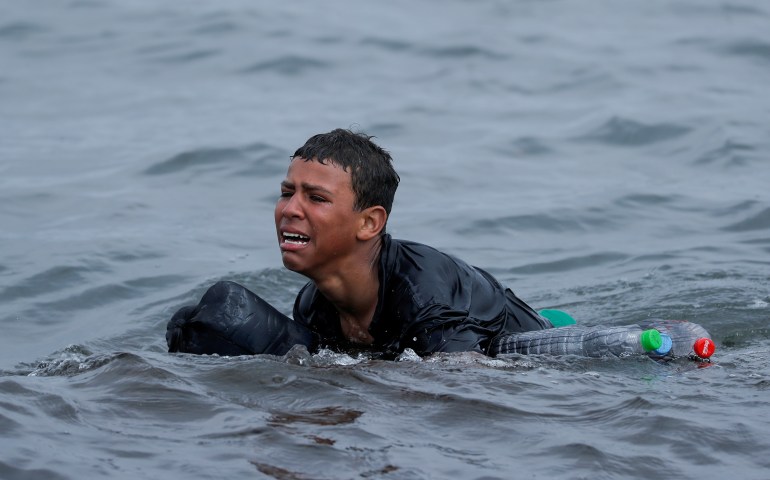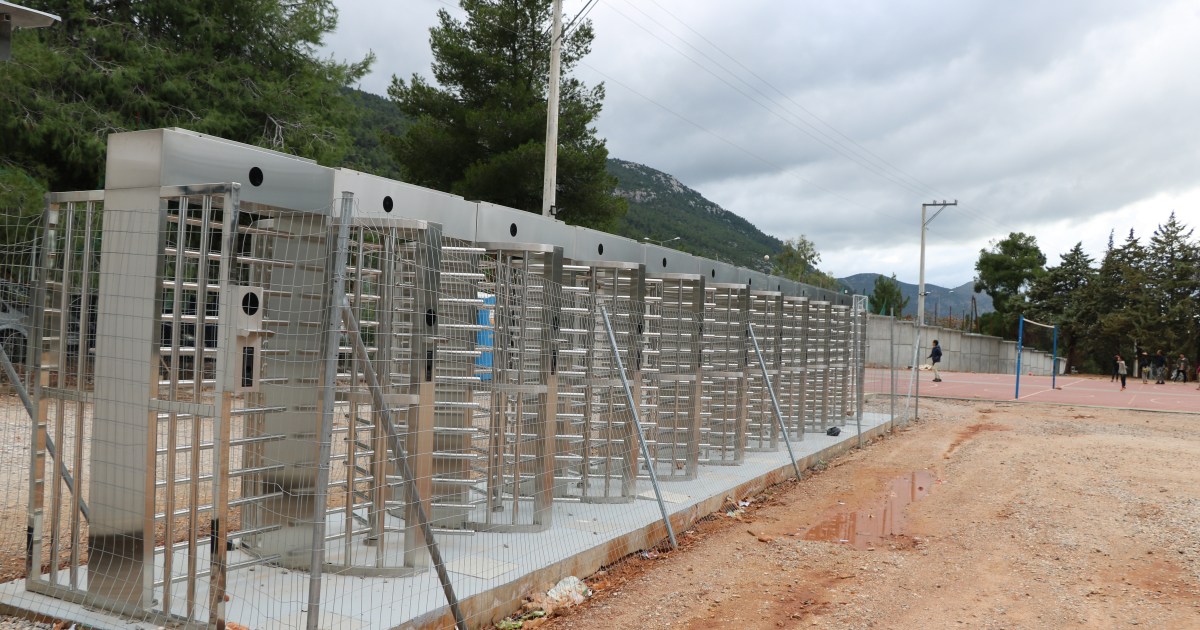Timeline: The European Union and migration in 2021 | Migration
Shipwrecks, fences and internal disagreements marked the European Union’s efforts this year to stave off new arrivals of refugees while trying to forge a humane migration policy consistent with international law.
Al Jazeera takes a look at some of 2021’s significant developments on the issue.
March
March 20 – The migration or interior ministers of Greece, Cyprus, Malta, Italy and Spain meet in Athens. They call for a strengthening of external borders and for a European mechanism to return migrants and refugees to their countries of origin.
March 29-30 – European Home Affairs Commissioner Ylva Johansson visits the Reception and Identification Centres on Samos and Lesbos for the first time. She announces the approval of 155 million euros ($175m) to build new camps on Lesbos and Chios, in addition to the 121 million euros ($137m) approved in 2020 for new camps to be built on Samos, Leros and Kos, and 22 million euros ($25m) to expand the reception centre at Fylakio, near the Turkish border.
April
April 22 – A shipwreck off the Libyan coast claims the lives of 130 people. The search and rescue ship Ocean Viking finds dozens of bodies in the water.
April 24 – Greece shuts down the Kara Tepe refugee camp on Lesbos, herding its hundreds of residents into a tent city at Mavrovounio. Following the burning of Moria camp in September 2020, Mavrovounio is the only large-scale refugee facility on the island. A new camp is to replace it in 2022.
May
May 11 – Greece proposes authorising Frontex – the EU’s collective border and coastguard agency – to operate outside EU waters to better prevent the flow of migrants towards Europe. In the context of the Mediterranean, this could imply patrolling international waters, but in the Aegean, it would almost certainly mean patrolling Turkish territorial waters.
May 18 – Thousands of migrants and refugees from African countries try to swim to the Spanish enclave of Ceuta from Morocco, threatening to overwhelm security forces. Video recordings show authorities throwing people back into the sea, but the European Commission remains silent about the incident. Dozens of migrants and refugees also try to enter the Spanish enclave of Melilla.
May 24 – Greek Prime Minister Kyriakos Mitsotakis receives Frontex chief Fabrice Leggeri in Athens, offering much-needed political support in the midst of a European Parliamentary effort to remove the Frenchman from his post over allegedly turning a blind eye to illegal pushbacks at EU borders.
May 26 – Belarusian President Alexander Lukashenko threatens to allow “migrants and drugs” to pour into neighbouring countries. By September, the number of Iraqi refugees crossing into Lithuania from Belarus was reported to be 4,100 by September – 55 times the previous year’s flows.
June
June 7 – A Greek ministerial decision enters into force deeming Turkey a safe third country for Afghans, Syrians, Somalis, Pakistanis and Bangladeshis. These nationalities represent 67 percent of asylum seekers in Greece. They are now rarely processed for asylum. Instead, they are asked if there is any reason why they should not apply next door in Turkey.
June 29 – The European Asylum Support Office welcomes an agreement to reestablish the body as a fully-fledged European Union Agency for Asylum, with more autonomy and funding. It will ultimately be tasked with redistributing asylum applications across the EU according to member states’ economic and social capacity to absorb them. A quota system first proposed in 2015 was rejected by a core of anti-immigration states.
 At least 6,000 migrants and refugees tried to swim to the Spanish enclave of Ceuta from Morocco in May [File: Jon Nazca/Reuters]
At least 6,000 migrants and refugees tried to swim to the Spanish enclave of Ceuta from Morocco in May [File: Jon Nazca/Reuters]July
July 11 – Authorities in Havana, Cuba suppress a large demonstration sparked by food shortages. In the weeks that follow, police go door-to-door, arresting participants who had been filmed. The crackdown leads to a covert exodus of possibly thousands of Cubans to Moscow, Minsk, Istanbul and Belgrade, from where they make their way into EU member states to seek asylum.
July 15 – The European Parliament issues a report saying Frontex was witness to pushbacks it did not prevent. The report does not find direct Frontex involvement in pushbacks. Members of the European Parliament or MEPs had called on Frontex chief Fabrice Leggeri to resign over pushbacks in December 2020.
July 19 – Police on Lesbos hold a press conference to announce they were indicting 10 individuals across four non-governmental organisations or NGOs for alleged espionage and trafficking activity. The NGOs in question are all active in search and rescue operations and have accused the Hellenic Coast Guard of conducting abandonments at sea.
July 21 – Greece and Germany issue a joint declaration in Berlin, calling for fair distribution of asylum applicants among member states.
July 25 – Possibly the worst single tragedy of the year takes place offshore Libya, with 150 people reportedly drowning in a shipwreck. Filippo Grandi, the head of the UN’s refugee agency, urges countries to assume their responsibilities in rescuing those in distress.
July – Greece’s government rounds up thousands of homeless refugees and moves them into camps across the mainland.
August
August 15 – The Taliban enters Kabul as then-President Ashraf Ghani flees, sealing their control over almost the entire country after a three-and-a-half-month campaign. Panicked residents rush to Kabul airport to flee Afghanistan, leading to an international campaign to covertly rescue as many as possible. Greece receives 819 Afghan evacuees by the end of November.
August 19 – Forty-five people, including children, drown north of Libya when the engine on their boat explodes.
August 25 – Greece submits to parliament a bill expanding police authority to order deportations, tightening the appeals process and shortening voluntary departure windows.
September
September 20 – The Samos Closed Controlled Access Centre begins to receive the refugee population from the town of Vathy.
September 22 – Greece receives its first Afghan evacuees since the fall of Kabul – seven female members of parliament and their families.
September 28-29 – Some 300 African migrants and refugees attempt to enter Ceuta, after false rumours that border security was relaxed.
October
October 1 – The Greek migration ministry takes over the management of cash aid to refugees, but payments are subsequently delayed causing hunger and difficulty of movement.
October – Lithuania continues work on a 500 kilometre-long (311 miles) fence along its border with Belarus. By then, refugees have been pouring over Belarus’s borders with Latvia and Poland as well. The EU accuses Belarusian President Alexander Lukashenko of attempting to destabilise neighbouring countries.
October 31 – The Hellenic Coast Guard rescues 380 refugees in a stricken ship south of Crete, in the largest refugee haul of the year. Sattelite-navigation system or GPS information supplied by NGOs suggests the authorities tried to send it back to Turkey before bringing passengers onshore in Kos.
 Greece is one of the main routes into the EU for migrants and refugees fleeing conflict and poverty in Asia, the Middle East, Africa and beyond [File: Yannis Behrakis/Reuters]
Greece is one of the main routes into the EU for migrants and refugees fleeing conflict and poverty in Asia, the Middle East, Africa and beyond [File: Yannis Behrakis/Reuters]November
November 12 – A refugee-filled boat sinks off the Libyan coast. Forty-six people are rescued and 30 bodies retrieved, but as many as 74 others are feared drowned.
November 24 – Twenty-seven refugees drown in the English Channel as they try to cross from France to Britain, in what was billed as the worst such tragedy in northern European waters.
November 27 – The Leros and Kos Closed Controlled Access Centres are inaugurated.
November – The European Commission shuts down flights bringing refugees to Belarus, and persuades Iraq to repatriate some of its nationals.
December
December 1 – The European Commission puts forward a set of temporary asylum procedures on the borders of Latvia, Lithuania and Poland with Belarus, which allow them to extend asylum registration and to apply “simplified and quicker national procedures” to deport those whose asylum applications are rejected.
December 20 – Albania and North Macedonia are added to the Greek migration ministry’s official list of safe third countries.
December 23-25 – Three sailing boats overfilled with refugees capsizes in relatively mild weather in three different parts of the Aegean, leading to at least 31 deaths and dozens of people missing. It is the worst Aegean death toll since October 2015, when a boat sank off the coast of Lesbos.





Pingback: go to my blog
Pingback: try here
Pingback: Buy Ketamine Nasal Spray
Pingback: magic boom bars